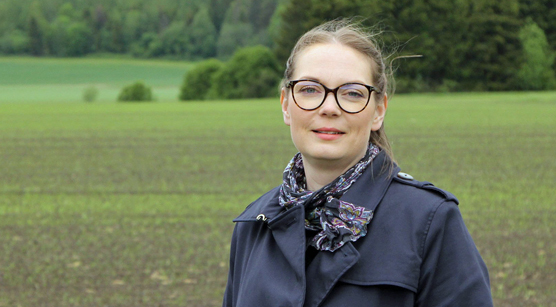Press release 2022-06-09 at 9:10

It is important to secure the availability of necessary nutrients. There is unrealised potential in wastewater, which we can no longer afford to lose, Suvi Lehtoranta says.
According to the dissertation, source separation of wastewater would significantly increase the efficiency of nutrient recovery from wastewater. Meanwhile, the climate impact of wastewater treatment would decrease. Nutrients in household toilet water could replace more than 20 percent of the mineral phosphorus fertilisers used in Finland and about 15 percent of mineral nitrogen fertilisers. SYKE researcher Suvi Lehtoranta will defend her dissertation at the University of Helsinki on the 17th of June.
Russia's war of aggression has raised prices of mineral fertilisers and has also reduced the availability of fertilisers. “It is important to secure the availability of necessary nutrients. There is unrealised potential in wastewater, which we can no longer afford to lose”, Suvi Lehtoranta says.
Only a fraction of the nitrogen that ends up in wastewater treatment plants is recycled, and the process used at the treatment plants converts the phosphorus into a form that weakens its usefulness for plants.
In her dissertation Lehtoranta studied source separation of wastewater and evaluated the lifecycle environmental impact of intensified recovery and recycling of nutrients.
Much more nitrogen could be recovered
Nitrogen is a critical nutrient in food production. Plants need it for growth, and especially for the formation of proteins. Finnish agriculture is largely dependent on imports from Russia for its nitrogen.
“If the nutrient-rich household toilet waters were separated from other wastewater, the recovery of nitrogen could be made considerably more efficient”, Suvi Lehtoranta says.
The efficiency of nutrient recovery depends, for example, on how the wastewater system is designed. In cities, the separation of wastewater could increase the recovery of nitrogen at least tenfold from the current level. The change brought about by the separation of wastewater would be even greater in rural areas: The efficiency of nitrogen recovery could be 30 times higher than it is now.
Separation of wastewaters in rural areas could also improve recovery of phosphorus 3–5-fold from the current level. In cities, the amount of recovered phosphorous would not change significantly, but the phosphorous would be put into circulation in a form that is more usable to plants.
Reduced harmful environmental effects
According to the study, source separation of household wastewater would reduce the impact of wastewater treatment on the climate to about half of the present level. The climate impact of wastewater treatment in rural areas would remain at the present level.
If recovered nutrients and energy produced from sludge were used to replace mineral fertilisers and fossil fuels, the climate benefits would be even greater.
Source separation of wastewater would also reduce eutrophication of bodies of water, especially in rural areas. However, acidifying emissions from the storage and utilisation of nutrients could increase. Acidifying emissions could be reduced by processing recovered nutrients into fertiliser products.
Source separation of wastewater would also reduce the number of harmful substances ending up in nutrients coming from landfills and industry, for example. “The use of wastewater-originated nutrients in agriculture requires that the safety of the nutrients for the environment is ensured. Source separation of wastewater would enable the better management of harmful substances. Nevertheless, it might be necessary to process the recovered nutrients further”, Suvi Lehtoranta explains.
Source separation would require great changes to infrastructure
Current wastewater management has been developed for the protection of human health and the state of bodies of water. Wastewater treatment is based on the removal, but not the recovery, of nutrients and organic substances.
“Source separation of wastewater would promote circular economy of wastewater treatment while strengthening security of supply in nutrients. However, the introduction of separation would require considerable changes in infrastructure. It should also be possible to utilise the recovered nutrients effectively in agriculture or industry”, Suvi Lehtoranta says.
“In new residential areas, and when refurbishing old ones, the separation of wastewater is nevertheless an option worth considering.
In other parts of Europe, for example in Sweden and The Netherlands, separation systems have already been introduced, and they are being built at a growing pace in urban development locations. In Finnish rural areas, source separation of wastewater is already in use in some locations. “In the future, source separation of wastewater could also be commonplace in Finland. The technical solutions already exist”, Lehtoranta says.
Further information
Suvi Lehtoranta, M.Sc., Senior Research Scientist, Finnish Environment Institute SYKE firstname.lastname@syke.fi, tel +358 295 251 362
Suvi Lehtoranta will defend her dissertation on 17 June 2022 at 12:00 at the Faculty of Agriculture and Forestry at the University of Helsinki. The event is in Finnish.
Address: Raisio-Hall (ls B2), Forest Sciences Building, Latokartanonkaari 7, Helsinki. The event can also be followed on video. (University of Helsinki, Events)
Dissertation: Towards circular economy in wastewater management – Environmental impacts, benefits and drawbacks of improved nutrient recovery and recycling by source separation (helda.helsinki,fi)